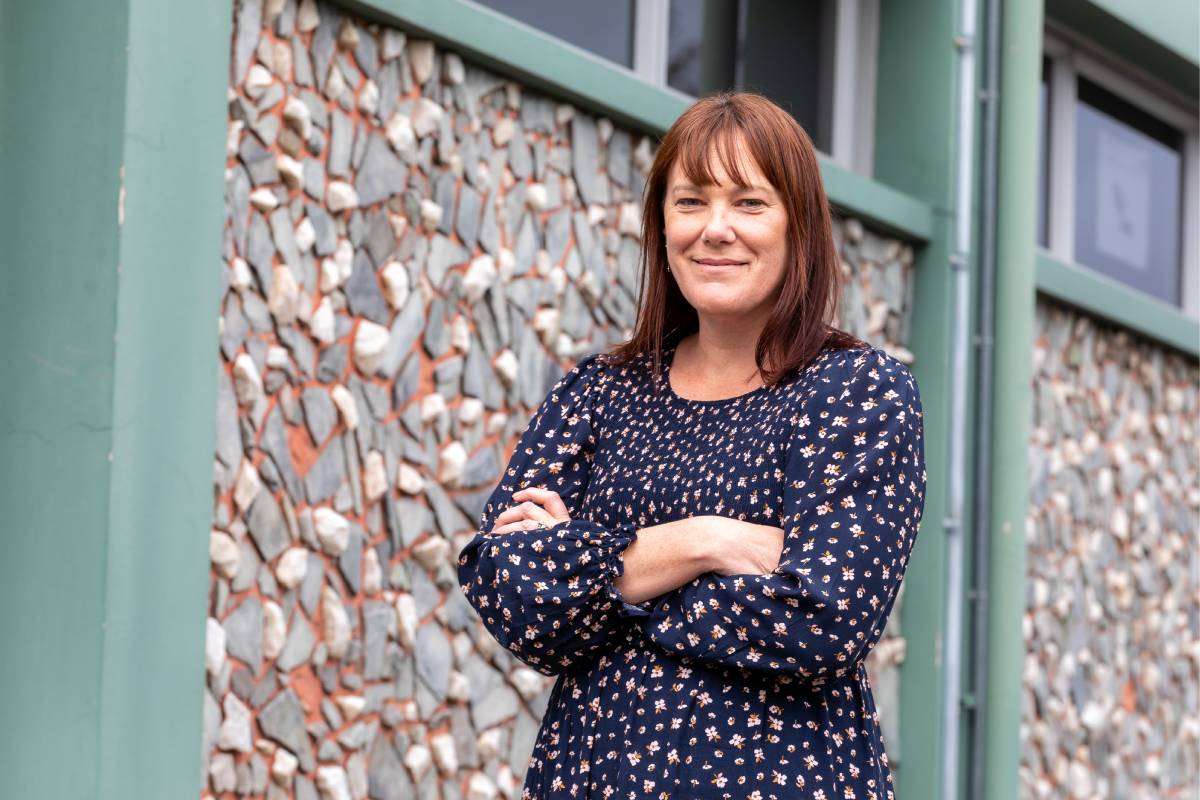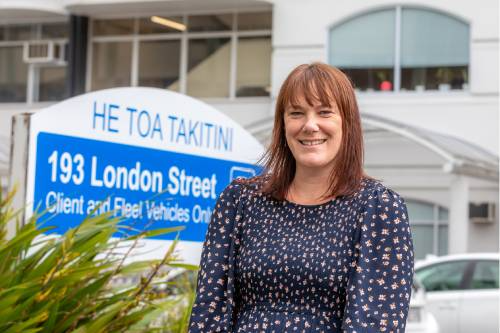Kristoffer Lavasi'i
Bachelor of Laws, Bachelor of Social Sciences

Nicola was awarded First Class Honours for her masters. She hopes that insights from her research will be used to help reduce violence in prison.
Te Whatu Ora

Qualification(s)
Subject(s)
As an experienced newspaper journalist, Nicola Brennan-Tupara was driven to make the world a better place and give a voice to people who didn’t have one.
But sitting in a court room, reporting on criminal trials, she started to wonder about the background stories of people sitting in the dock.
Two people can have backgrounds of trauma, but one turns to a life of crime, and one doesn’t,” says Nicola. “I wanted to understand the differences, and the mechanisms for what goes on - not just within the person but their surroundings, their family and their whole environment.
That curiosity – and an ongoing drive to help others - compelled her to make a mid-career change from journalism to psychology in 2017.
She enrolled in The Psychology of Criminal Conduct (PSYCH580) paper at Waikato University, taught by Professor Devon Polaschek.
Nicola had done some undergraduate study in psychology before becoming a journalist, and quickly rediscovered her passion for the subject.
I loved it, immediately. It helped that I went into Devon’s paper – but then I’ve loved every paper that I’ve done.
She also enjoyed Kaupapa Māori Psychology (PSYCH575) and a paper on adult mental health and well-being.
The newly opened Te Puna Haumaru – New Zealand Institute for Security and Criminal Science, was another drawcard to studying at Waikato.
Initially, Nicola began working on a Postgraduate Diploma (Psychology), chipping away at it paper-by-paper while still working as Regional News Director at Waikato Times.
Juggling postgraduate studying with a full-time job in a busy newsroom and being mum to young twin boys wasn’t easy.
A supportive boss, help from her mother and husband, and good time management skills were vital to her success.
“There was also a lot of working at night. I’d put the kids to bed at night then study.”
In 2020, after Covid-19 lockdowns, she resigned from her job to study fulltime, and was able to complete her PG Diploma (Psych) with Distinction in B Trimester that year.
In 2021, Nicola began her Master of Social Sciences (Psychology) degree and was awarded an MBIE-funded scholarship to work on Nga Tūmanakotanga, led by Dr Armon Tamatea.
“The project is about understanding prison violence, what leads to it, how we can intervene to stop it. My particular part was understanding gangs’ involvement in prison violence.
We know that gangs are over-represented when it comes to violence in prison, so they are more likely to be involved in it. But we don’t know ‘the why’. I wanted to understand ‘the why’, and if you want to understand ‘the why’ on prison violence, why not go to speak to the [gang members] themselves? And that’s what I did.
She conducted 14 interviews with gang members – including some by audio link due to Covid-19 restrictions.
Her research resulted in a descriptive model of institutional gang violence.
“It talks about the background factors from early childhood that influence prison violence, and then the factors just before an event, and during an event and after. I examined their thoughts and feelings, their interactions with other people, the prison environment and how that influences events unfolding.”
Nicola was awarded First Class Honours for her master’s. She hopes that insights from her research will be used to help reduce violence in prison.
School of Psychology staff, including her master’s supervisor Professor Polaschek, were supportive and friendly.
“If you see them in the hall, they always say hello. Devon kept me going, when I had self-doubt. Armon as well. Kirsty Dempster-Rivett was another big influence on me and was supportive. They are all good people who want you to do well.”
Nicola enjoyed the broad range of skills and perspectives she learned at Waikato, including the programme’s strong focus on community psychology.
It gives you a different perspective on psychology – it moves away from the individual to wider organisational systems, and how they can be changed to help
She says Psychology at Waikato sets students up for success in a variety of future careers.
“The great thing about psychology is that there are so many different avenues. You can do research; you can go into policy and be part of wider change; you can practice clinically, and work with individuals and communities.”
As an experienced newspaper journalist, Nicola Brennan-Tupara was driven to make the world a better place and give a voice to people who didn’t have one.
But sitting in a court room, reporting on criminal trials, she started to wonder about the background stories of people sitting in the dock.
Two people can have backgrounds of trauma, but one turns to a life of crime, and one doesn’t,” says Nicola. “I wanted to understand the differences, and the mechanisms for what goes on - not just within the person but their surroundings, their family and their whole environment.
That curiosity – and an ongoing drive to help others - compelled her to make a mid-career change from journalism to psychology in 2017.
She enrolled in The Psychology of Criminal Conduct (PSYCH580) paper at Waikato University, taught by Professor Devon Polaschek.
Nicola had done some undergraduate study in psychology before becoming a journalist, and quickly rediscovered her passion for the subject.
I loved it, immediately. It helped that I went into Devon’s paper – but then I’ve loved every paper that I’ve done.
She also enjoyed Kaupapa Māori Psychology (PSYCH575) and a paper on adult mental health and well-being.
The newly opened Te Puna Haumaru – New Zealand Institute for Security and Criminal Science, was another drawcard to studying at Waikato.
Initially, Nicola began working on a Postgraduate Diploma (Psychology), chipping away at it paper-by-paper while still working as Regional News Director at Waikato Times.
Juggling postgraduate studying with a full-time job in a busy newsroom and being mum to young twin boys wasn’t easy.
A supportive boss, help from her mother and husband, and good time management skills were vital to her success.
“There was also a lot of working at night. I’d put the kids to bed at night then study.”
In 2020, after Covid-19 lockdowns, she resigned from her job to study fulltime, and was able to complete her PG Diploma (Psych) with Distinction in B Trimester that year.
In 2021, Nicola began her Master of Social Sciences (Psychology) degree and was awarded an MBIE-funded scholarship to work on Nga Tūmanakotanga, led by Dr Armon Tamatea.
“The project is about understanding prison violence, what leads to it, how we can intervene to stop it. My particular part was understanding gangs’ involvement in prison violence.
We know that gangs are over-represented when it comes to violence in prison, so they are more likely to be involved in it. But we don’t know ‘the why’. I wanted to understand ‘the why’, and if you want to understand ‘the why’ on prison violence, why not go to speak to the [gang members] themselves? And that’s what I did.
She conducted 14 interviews with gang members – including some by audio link due to Covid-19 restrictions.
Her research resulted in a descriptive model of institutional gang violence.
“It talks about the background factors from early childhood that influence prison violence, and then the factors just before an event, and during an event and after. I examined their thoughts and feelings, their interactions with other people, the prison environment and how that influences events unfolding.”
Nicola was awarded First Class Honours for her master’s. She hopes that insights from her research will be used to help reduce violence in prison.
School of Psychology staff, including her master’s supervisor Professor Polaschek, were supportive and friendly.
“If you see them in the hall, they always say hello. Devon kept me going, when I had self-doubt. Armon as well. Kirsty Dempster-Rivett was another big influence on me and was supportive. They are all good people who want you to do well.”
Nicola enjoyed the broad range of skills and perspectives she learned at Waikato, including the programme’s strong focus on community psychology.
It gives you a different perspective on psychology – it moves away from the individual to wider organisational systems, and how they can be changed to help.
She says Psychology at Waikato sets students up for success in a variety of future careers.
“The great thing about psychology is that there are so many different avenues. You can do research; you can go into policy and be part of wider change; you can practice clinically, and work with individuals and communities.”
In 2021, Nicola was successful in getting into the University’s clinical psychology programme, a highly competitive three-year diploma.
The highlight of the PGDip (Clinical) programme was the connections she made.
“What I really like about Waikato is that it is a small programme, so it’s fairly intimate. You get to know the other year-level students really well. We have case conference every Monday – so you are with the first years, the second years, and the interns – so you become like a little family.
“The programme also has good connections with other organisations in the community, starting in the first year.”
She completed the programme in 2023, finishing with a job offer from internship provider, Te Whatu Ora.

Nicola Brennan-Tupura is using what she has learnt in the School of Psychology to support people in the community.
Nicola is looking forward to working as a clinical psychologist in community mental health, where she can integrate all she has learned.
“The goal is to make the world a little bit better. That’s why I got into journalism too. If you can make a little change somewhere, maybe that can have some flow on effects somewhere else. That’s why I do what I do – to make some positive change in someone’s life.

Qualification(s)
Subject(s)
You are currently viewing the website as an international visitor, you might want to change to domestic.
You're an international student if you are:
You're a domestic student if you are: